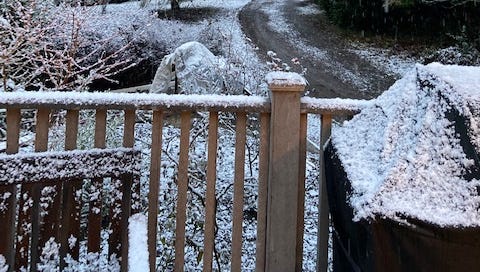The snow came down in fat flakes, lazily, all night. By the third day, there was enough powder and ice to sled on, and it didn’t take much coaxing to get the children outside. Well, maybe a little. The promise of hot cocoa does do wonders.
I am glad for the winter and its cold, for the invitation—the expectation—to slow down, to sink down, to settle into a hibernation of contemplation and rest. It wakens in me a longing to do just those things, but much like Cinderella with news of the ball, it seems an impossibility at the moment. After all, there are still three meals a day to make, children to school, laundry to do. I am now 52 years old, and decades later, the trenches of homemaking never seem shallow enough to look over the edge. I thought it would be easier by now.
I creak open the woodstove in the kitchen and gently feed in another log. I can hear the children squealing outside, all but Ruby, who insists upon sitting on the couch inside, stemming. Ruby has Down syndrome (like one of her younger, biological sisters, Poppy). Both of those girls are growing in stature, but their development seems like a foggy stretch of time, an unclear and continual toddlerhood, an unending expedition to every therapist, enigmas beyond this world’s ability to unlock. How much can be done? How much just is?
I take out the pot, and measure out the cocao (1/2 cup) with unrefined sugar (1/2 cup), and add a cup of water. I set it on the hot stove, the electric (and probably unnecessary) one. The fire in the corner cracks and on occasion, roars—it’s difficult not to stare and get sidetracked, though I could probably call that distraction “contemplation and rest”. I consider supper instead, and pull out vegetables to begin peeling and slicing for the stew, vegetables I did not grow but I bless the farmer two miles away who did. I’m thinking of the radio personality I heard lately, the one who exhorted me to live in such a way that they’d have to find more chairs at my funeral. But I live a fairly quiet life, working with my hands, tending to my family right here from home. I remind myself that although I know there won’t be hundreds of chairs, I do know the One who sees me, El Roi, and His train alone fills the temple of which I am a part. I look up at my little lighted cross on the wall, thank Him, and add whole, raw milk (8 cups worth) and a splish of vanilla to the melted cocao pot. The pot is almost overflowing. Just like my home. Just like my heart, when I renew my mind and allow it to meditate on such things.
The kitchen door slides open with a bang and in tumble children with masses of coats and boots and mittens launched and strewn all over the brick floor. I try to grab this moment (be thankful you have this cherished chaos) while bribing—I mean reminding—them to tidy up before getting their hot drinks. The noise. The cold coming in from the open door. The disorder and flecks of mud bouncing off dropping footwear. Meanwhile, the whipping cream splatters a bit, despite shielding with my palm, and I notice the snow is coming down again in real earnest. I hope our power stays on this time.
One by one, a large ladle fills open mugs held by little hands and fluffy clouds of whipped cream is layered on top of each pool of cocao. Sprinkles, of course. Maybe this is my glass slipper, I think: the place that fits just right, the time that is now, my place in the world, this moment in history, under this roof, on this land, in His hands. Is this what it means to be settled? Am I settled, then? Maybe I am not in the trenches after all, but in high places.
Lord, give me eyes that I may see.




